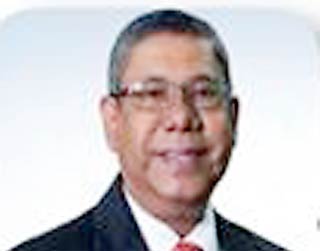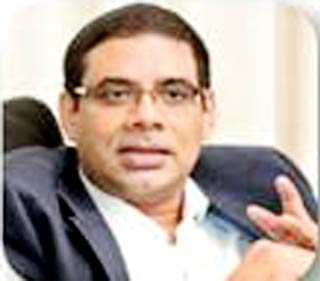Tuesday Feb 17, 2026
Tuesday Feb 17, 2026
Wednesday, 23 June 2021 02:46 - - {{hitsCtrl.values.hits}}

 |
| DCS Singapore CEO Saman Wimalaratne |
 |
| KPMG – Middle East and South Asia (MESA) Chairman Reyaz Mihular |
 |
| ICCSL Chairman Dinesh Weerakkody
|
The COVID-19 pandemic has had a significant impact on the way individuals save and invest. This changing investment climate can engender new opportunities for Asia. In this context, the International Chamber of Commerce (ICC), Sri Lanka in association with the Daily FT, Boston Consulting Group (BCG) and CIMA, organised a discussion on ‘Investing in Asia in the New Normal’.
Today, we are observing the emergence of new trends that can pave the way forward and shape the future of investments. According to ICC Chairman, MasterCard Worldwide Executive Chairman Ajay Banga, “Digitisation has become a common word during the pandemic with digital now getting ingrained in the new normal.” However, he believes that this widespread adoption of digitisation can also lead to a digital divide where Small and Medium Enterprises that do not have access to the relevant digital infrastructure might witness a slower recovery compared to their more digitally enabled counterparts.
From the perspective of the investment climate he said, “Asia remains mission critical as it is home to nearly 50% of the world’s population and has fairly economically sound markets. These are markets that the world ignores at its own peril.” Overall, he is generally optimistic about Asia in 2022 and believes that 2021 will remain a bit choppy.
The fecund investment climate is evident in the way wealth has been created in Asia in 2020. However, it is important to note that Asia is now investing differently. According to BCG Managing Director and Partner Mayank Jha, “The investment mix in Asia today is very different from what it was five years ago. There has been a clear fall in cash holdings and a shift towards equities.” In India, the share of financial savings has been increasing over the years with mutual funds, provident funds, and equities showing the highest growth. However, when it comes to mutual fund penetration, many Asian countries lag their global counterparts.
For example, mutual fund assets as a percentage of GDP are at 120% in the United States and 81% in France. The same metric for India, China and Sri Lanka is 13%, 13%, and 2%, respectively. This suggests that a lot more needs to be done to develop Asia’s investment markets. Some of the measures suggested by Mayank Jha include deepening and enabling regulatory norms, deeper distribution via Independent Financial Advisors (IFAs), and focus on investor education.
The global investment climate today is characterised by high debt and low yield. When discussing global debt, it is important to differentiate between sovereign, corporate, and household debt – the most eye-popping numbers are related to sovereign debt. “This ballooning of sovereign debt was inevitable,” believes Central Bank of Sri Lanka Former Governor Dr. Indrajit Coomaraswamy. To mitigate the economic impact of the pandemic, governments and central banks across the world have had to become fiscally profligate, increase healthcare outlay, and introduce support schemes for low-income households. Correspondingly, global interest rates are also at very low levels. According to NP Capital Ltd. Chairman Nimal Perera, “For traditional fixed-income investors, a low-interest rate environment means that they now need to look at other investment avenues. Equities is an option that is being actively considered.”
Endorsing this view in part, AIA Group Market Economist – Group Investment Herve Lievore said, “World-wide, we are in a low yield environment, and, while there might be potential for slightly higher nominal yields, the chances remain minuscule. In such an environment, technology can offer new avenues for investments.” He also said that while it might be prudent to expect some drawdowns, these are likely to be short-lived.
When it comes to discussing new investment avenues and trends, Eric Roeder, UNESCAP Asia Pacific, points out that impact investing, especially via Environment, Social, and Governance (ESG) filters, is now becoming increasingly popular. According to him, “Younger investors are particularly interested in investing in companies that do not pose a greater risk to the environment.”
These thoughts are echoed by Colombo Stock Exchange Chairman Dumith Fernando, who believes that while in the short-term investors might focus only on financial returns, in the long-term they are likely to shift focus to impact returns. “The traditional efficient market theory is two dimensional as it expresses the relationship between risk and return. However, impact adds a third dimension, one that needs to be quantified in a common language,” shares Dumith.
DCS Singapore Ltd. CEO Saman Wimalaratne observes changes in investment trends and expects them to continue in this decade as well. The four key trends include:
Growth in the Asian PE market 2016-2020
Focus of Venture Capital (VC) firms on digitisation, technology development, healthtech, fintech, cleantech, etc.
Increase investment in research and development
Asia as the largest source of global FDI outflows
He believes that investors are likely to focus on digital opportunities and digital platforms.
In this backdrop, Sri Lanka can take some key measures to orient itself for the new normal and position itself as an investment destination of choice. According to Board of Investment Sri Lanka Former Chairman, TWCorp Ltd. Chairman/CEO Thilan Wijesinghe, Sri Lanka can achieve this by moving the policy needle towards greater economic integration with its neighbours, improving the macroeconomic scenario, and creating a consistent regulatory environment.
Asia is well-positioned to capitalise upon the opportunities precipitated by the pandemic to become the investment powerhouse of the new normal. The time to act is now.
The session was moderated by ICCSL Chairman Dinesh Weerakkody and KPMG (MESA) Chairman Reyaz Mihular.